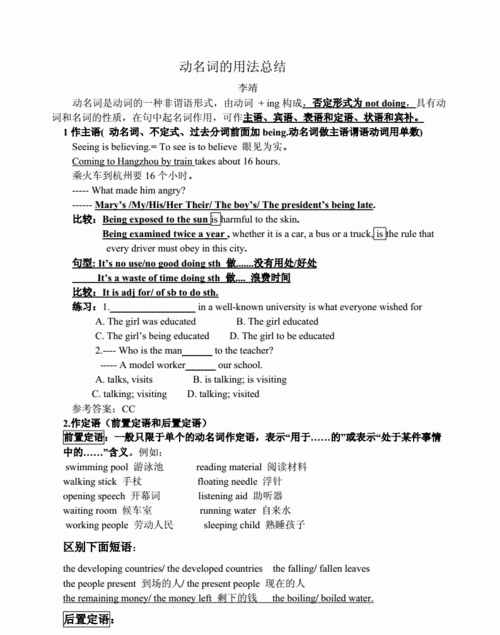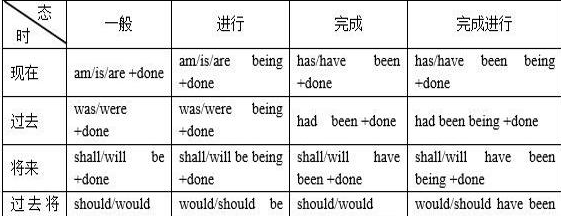本文目录
小升初语法知识点总结课件
小升初必备语法名词的格知识点考点梳理
在英语中有些名词可以加"'s"来表示所有关系,带这种词尾的名词形式称为该名词的所有格,如:a teacher's book。名词所有格的规则如下:

1) 单数名词词尾加"'s",复数名词词尾没有s,也要加"'s",如the boy's bag 男孩的书包,men's room 男厕所。
2) 若名词已有复数词尾-s ,只加"'",如:the workers' struggle 工人的斗争。
3) 凡不能加"'s"的名词,都可以用"名词+of +名词"的结构来表示所有关系,如:the title of the song 歌的名字。
4) 在表示店铺或教堂的名字或某人的家时,名词所有格的后面常常不出现它所修饰的名词,如:the barber's 理发店。
5) 如果两个名词并列,并且分别有's,则表示"分别有";只有一个's,则表示'共有'。
如:John's and Mary's room(两间) John and Mary's room(一间)
6) 复合名词或短语,'s 加在最后一个词的词尾。
如:a month or two's absence
英语语法经典例题800例:非谓语动词(例题1)
【导语】 英语语法让很多学生都头疼,因为复杂难懂的句式和词组有时难以记忆。为大家整理了英语语法大全,希望对同学们的英语语法学习有所帮助。更多内容尽在。
1. Everyone in our class was working hard and doing what we could _______ a good college.
A. enter B. to enter
C. entering D. entered
【陷阱】 容易误选A。有的同学一看到空格前的情态动词 could 就断定此处应填动词原形 enter。
【分析】 其实正确答案应是B。此句为省略句,即在 could 后省略了动词 do,若把句子补完整应为Everyone in our class was working hard and doing what we could do to enter a good college。即句中的不定式短语(to enter a good college)是用作目的状语的,而不是与情态动词(could)一起构成谓语。请再看类似例句:
(1) They did what they could to comfort her. 他们尽量安慰她。
(2) They did everything they could to save her life. 他们尽一切力量拯救她的性命。
(3) He studies as hard as he could to catch up with his classmates. 他拼命学习以便赶上他的同学。
值得指出的是,这也并不是说今后只要遇到类似结构的题就一定选带to不定式。请看以下试题:
(4) He ran as fast as he could _____ to catch the early bus.
A. to hope B. hope
C. hoping D. hoped
此题的答案是 C不是A,其中的现在分词短语 hoping to catch the early bus 用作伴随状语。
(5) He spent every minute he could _____ spoken English.
A. practise B. to practise
C. practising D. practised
此题答案选 C,这与前面动词 spent 的搭配有关,即 spend … (in) doing sth。若将此句补充完整,即为 He spent every minute he could spend in practising spoken English.
(6) Before going abroad he devoted all he could ____D____ his oral English.
A. improve B. to improve
C. improving D. to improving
此题答案选D,注意两点:一是 devote … to … 是固定搭配,意为“把……贡献给……”;二是其中的 to 是介词,不是不定式符号,后接动词时要用动名词。
2. He knows nothing about it, so he can’t help _______ any of your work.
A. doing B. to do
C. being doing D. to be done
【陷阱】 容易误选B,根据 can’t help doing sth 这一结构推出。
【分析】 其实答案应选A。比较以下结构:
can’t help to do sth = 不能帮助做某事
can’t help doing sth = 禁不住做某事,情不自禁地做某事
又如下面一题,答案也是 B:
She can’t help ____ the house because she’s busy making a cake.
A cleaning B. to clean
C. cleaned D. being cleaned
再请看以下试题:
While shopping, people sometimes can’t help _____ into buying something they don’t really need.
A. to persuade B. persuading
C. being persuaded D. be persuaded
此题应选C,句中的 can’t help 意为“禁不住”(注意根据句意用被动形式)。
3. All her time _______ experiments, she has no time for films.
A. devoted to do B. devoted to doing
C. devoting to doing D. is devoted to doing
【陷阱】 几个干扰项均有可能误选。
【分析】 此题最佳答案为B。现分析如下:
(1) devote 意为“致力于,献身于”,主要用 devote…to…或be devoted to,其中的to 是介词,不是不定式符号,故后接动词时要用动名词,不用不定式。
(2) 选A错误:若将 do 改为 doing 则可以。
(3) 选B正确:all her time devoted to doing experiments为独立主格结构,用作状语。
(4) 选C错误:因为all her time 与 devote 为被动关系,故应将devoting改为devoted。
(5) 选D错误:若单独看 All her time is devoted to doing experiments,此句并没有错,但问题是逗号前后两个简单句没有必要的连接方式,所以从整体上看仍不对,假若在后一句的句首加上and或so,则可选D,或将D将中的is 改为 being也可选它。
英语语法经典例题800例:虚拟语气(例题)
【导语】 英语语法让很多学生都头疼,因为复杂难懂的句式和词组有时难以记忆。为大家整理了英语语法大全,希望对同学们的英语语法学习有所帮助。更多内容尽在。
1. I forget where I read the article, or I _____ it to you now.
A. will show B. would show
C. am going to show D. am showing
【陷阱】 几个干扰项均有可能误选。
【分析】 正确答案选B。根据上文的语境可知句中的 or 隐含有一个虚拟的条件,即 or=if I didn’t forget where I read the article(要是我没忘记我在哪儿读过这篇文章的话——但事实上忘了)。
2. “It looks as if he were drunk.” “So it does. _____.”
A. He’d better give up drinking
B. He shouldn’t have drunk so much
C. Health is more important than drink
D. I wonder why he is always doing so
【陷阱】 几个干扰项均有可能误选,主要是受句中 drunk 一词的影响。
【分析】 最佳答案为D。关键信息是It looks as if he were drunk 中的虚拟语气,句子既然用了虚拟语气,也就是说,“他喝醉了”不是事实,只是他的`言行好像是醉了,所以此题的最佳答案是D。
3. “Mary looks hot and dry” “So _____ you if you had so high a fever.”
A. do B. are
C. will D. would
【陷阱】 容易误选A或C。选A者,认为前后两句的动词性质应一致;选C者,认为其后带有if 条件状语从句,从语气上看,主句应用将来时态。
【分析】 此题最佳答案为D。分析如下:
(1) “so + 助动词 + 主语”是一个很有用的结构,它表示“……也一样”时。如:
He likes to watch TV, and so do I. 他喜欢看电视,我也一样。
When animals and plants disappear, so will man. 当动植物消失的时候,人类也会随之消失。
(2) 由于空格后的 if 条件状语从句的谓语用的是虚拟语气(这是很重要的信息),所以主句要用 would 而不用 will,即答案应选D。
英语语法经典例题800例:强调句(例题)
【导语】 英语语法让很多学生都头疼,因为复杂难懂的句式和词组有时难以记忆。为大家整理了英语语法大全,希望对同学们的英语语法学习有所帮助。更多内容尽在。
1. ____ that caused him to serve dinner an hour later than usual.
A. It was we being late B. It was our being late
C. It was we were too late D. It was because we were late
【陷阱】 此题容易误选D,认为强调的是原因状语从句 because we were late。
【分析】 但实际上,此题的答案为B,强调的是句子主语 our being late,此题若还原成非强调句,即为:
Our being late caused him to serve dinner an hour later than usual.
注意,强调句的一个显著特点是,若去掉强调结构 it is [was]… that…,句子仍然成立;换句话说,该结构中的 that 不能充当句子成分。
2. “How was ______ they discovered the entrance to the underground palace?” “Totally by chance.”
A. it that B. he that
C. it when D. he which
【陷阱】 几个干扰项均可能误选。
【分析】 答案选A,为强调句的特殊疑问句形式,其相应的陈述句形式为:
It was totally by chance that they discovered the entrance to the underground palace.
比较以下各题,它们也属强调句的特殊疑问句形式:
(1) Who was it _____ saved the drowning girl?
A. since B. as C. that D. he
答案选C,被强调成分为 who,该句实为类似 It was Tom that saved the drowning girl. 这类强调句的特殊疑问句形式(即对其中的Tom 提问而得)。
(2) What is it _____ his daughter needs most?
A. what B. which C. that D. if
答案选C,被强调成分为 what,该句实为类似 It is a bike that his daughter needs most. 这类强调句的特殊疑问句形式(即对其中的a bike 提问而得)。
3. _____ was very ______ that little Jim wrote the letter.
A. It, careful B. It, carefully
C. He, careful D. He, carefully
【陷阱】 几个干扰项均有可能误选,但最有可能误选的可能是A,认为这是一个普通的系表结构,即认为第二空要填形容词作表语。
【分析】 其实,此题是一个强调句,其非强调形式为 Little Jim wrote the letter very carefully. 若用 it is … that… 的强调句式强调其中的状语 very carefully 即为上面一题的题干,所以答案应选B。请看下面几例,也属强调结构:
(1) It was when she was about to go to bed ______ the telephone rang.
A. since B. as C. that D. then
答案选C,被强调成分为 when she was about to go to bed 这一时间状语从句。
(2) It may have been at Christmas _____ John gave Mary a handbag.
A. before B. who C. that D. when
答案选C,被强调成分为 at Christmas,其中的动词 be 采用了 may have been 这一较为复杂的形式。
4. “Where did you find the professor who made the speech yesterday?” “It was in the hall ______ the students
often have a meeting.”
A. where B. which
C. that D. when
【陷阱】很可能误选C,认为这是一个强调句,强调地点状语 in the hall。
【分析】假若选C,即有 It was in the hall that the students often have a meeting,该句的意思是“学生们通常是在
大厅开会”,单独看这一句,无论是其意思还是其语法均未错,但若将其与上文联系起来看,则不通,因为上文的意思是“你是在
哪儿找到昨天作报告的那位教授的?”假若将答句改为 It was in the hall that I found the professor,则完全可以。
其实,此题的最佳答案是A,where the students often have a meeting 为定语从句,用以修饰其前的名词 the hall,句意
为“是在学生们经常开会的那个大厅(找到教授的)”,这样语意就通顺了。
5. It was what he meant rather than what he said ______ annoyed me.
A. which B. as
C. what D. that
【陷阱】几个干扰项均有可能误选。
【分析】此题为一个强调句型,空格处应填 that (即选D),被强调成分为 what he meant rather than what he said。句意
为“让我生气的不是他说的话,而是他话中的意思”。请再看两例:
(1) It was his nervousness in the interview ______ probably lost him the job.
A. which B. since C. that D. what
答案选C,为强调句型,被强调成分为 his nervousness in the interview,句意为“很可能是面试时表现出紧张,使他失去
了这份工作”。
(2) It is the ability to do the job ______ matters not where you come from or what you are.
A. one B. that C. what D. it
答案选B,为强调句型,被强调成分为 the ability to do the job,句意为“重要的是你做工作的能力,而不是你来自何地
或你是从事什么工作的”。
英语语法大全经典例题800例:名词性从句(例题)
【导语】 英语语法让很多学生都头疼,因为复杂难懂的句式和词组有时难以记忆。为大家整理了英语语法大全,希望对同学们的英语语法学习有所帮助。更多内容尽在。
◆典型陷阱题分析◆
1. She was so angry and spoke so fast that none of us understood _______ he said meant.
A. that B. what
C. that that D. what what
【陷阱】 可能误选B。许多同学一看选项首先就排除了C和D,认为这样两个“引导词”叠用的情况不太可能。在A和B两个选项中,选项A肯定不行,因为它引导宾语从句时不能充当句子成分,所以便选择了B。
【分析】 正确答案选 D。第一个what 用作动词 meant 的宾语,第二个what 用作动词 said 的宾语,即在 none of us understood what what he said meant 中,none of us understood 为主句,what what he said meant 为宾语从句,而在此宾语从句中又包括有 what he said 这样一个主语从句。
2. After _______ had happened he could not continue to work there.
A. which B. how
C. what D. having
【陷阱】 可能误选A。
【分析】 最佳答案选 C。有的同学误选A,是因为认为介词后应接关系代词 which,但实际上,若填关系代词,其前没有先行词,这根据不是一个定语从句。另外,由于 had happened 缺主语,所以B和D也不能选。请再做下面一题(答案选B):
He pointed to ______ looked like a tomb and said, “Ghost.”
A. that B. what
C. which D. as
3.“Is ______ you want to say?” asked the teacher.
A. this B. that
C. all that D. that all
【陷阱】 根据中文字面意思误选A或B。
【分析】 最佳答案选 D。假若选A或B,那么转换成陈述句即为:This is you want to say. / That is you want to say. 显然句中的两个谓语动词 is与want相冲突。选D组成的句子是 Is that all you want to say? 其中的that 为句子主语,all 为表语,you want to say 为定语从句,用以修饰all。
4. “When ______ leave for Japan?” “When ______ leave for Japan is kept secret.”
A. they will, will they B. will they, they will
C. they will, they will D. will they, will they
【陷阱】 可能误选D,认为 when 后应用疑问句词序。
【分析】 最佳答案选 B。第一个when引出的是一个特殊疑问句,故用疑问词序;第二个 when 引出的是主语从句,故其后用陈述句词序。请做以下试题(答案选C):
(1) None knows if _______ that boy, but if _______ him, her parents will be disappointed.
A. she will marry, she will marry B. she marries, she marries
C. she will marry, she marries D. she marries, she will marry
(2) “Where _______ go to work?” “Where _______ go to work is not known.”
A. we shall, we shall B. shall we, shall we
C. shall we, we shall D. we shall, shall we
5. Someone is ringing the doorbell. Go and see ______.
A. who is he B. who he is
C. who is it D. who it is
【陷阱】 几个干扰项均有可能误选。
【分析】 此题最佳答案为D。首先可以排除A和C,因为空格处实为一个宾语从句,所以不能用疑问句词序。另一方面,但按英语习惯,当用于指代身份不明的人时,要用代词it,而不用 he 或she等。比较以下两句:
Mr Smith is at the door. He wants to see you. 史密斯先生在门口,他想见你。
Someone is at the door. It may be the postman. 有个人在门口,可能是邮递员。
第一句因前面指明了是 Mr Smith,所以后面用代词 he;而第二句因前面用的是不定代词 someone,说明此人身份尚不明确,故其后用了代词 it 来指代。
6. Don’t you know, my dear friend, ______ it is your money not you that she loves?
A. who B. which
C. that D. what
【陷阱】 此题容易误选 A或B:选 A 的同学认为这是指人的,故用who;选B的同学认为这是非限制性定语从句,两者都是误认为这是定语从句(注意没有先行词)。
【分析】 其实答案应选C。that引导的是一个宾语从句,用作动词 know 的宾语,它只是被句中的插入语 my dear friend 隔开罢了。请做以下试题(答案均为C):
(1) Everyone knows, perhaps except you, _______ your girl-friend is a cheat.
A. who B. which
C. that D. what
(2) I think, though I could be mistaken, ______ she liked me.
A. who B. which
C. that D. what
(3) He told me the news, believe it or not, ______ he had earned $1 000 in a single day.
A. that B. which
C. as D. because
前面两题 that 引导宾语从句,后面一题 that同位语从句(修饰the news)。
英语语法大全:特殊同位语归纳
英语语法让很多学生都头疼,因为复杂难懂的句式和词组有时难以记忆。为大家整理了英语语法大全,本章主要介绍英语语法中的句子成分,希望对同学们的英语语法学习有所帮助。更多内容尽在。
特殊同位语归纳
当两个词或词组在一个句子中具有相同的语法地位而且描述相同的人或事物时,我们称它们为同位语。基本形式的同位语大家一般不会出错,但有几种同位语,或由于本身结构特殊,或由于它修饰的成分结构比较特殊,往往会引起误解。现小结并举例说明如下,希望引起同学们的注意。
1. 代词we, us, you等后接同位语
Are you two reading? 你们二人在看书吗?
They three joined the school team. 他们3人参加了校队。
She has great concern for us students. 她对我们学生很关心。
He asked you boys to be quiet. 他要你们男孩子安静些。
We girls often go to the movies together. 我们女孩子经常一起去看电影。
2. 不定式用作同位语
Soon came the order to start the general attack. 很快下达了发起总攻的命令。(to start the general attack与the order同位)
He followed the instruction to walk along a certain street where I picked him up. 他照吩咐沿某一条街走,我在那里接他上了车。(to walk along…与the instruction同位)
3. -ing分词用作同位语
He's getting a job tonight driving a truck. 他今晚得到一个开卡车的差事。(driving a track与a job同位)
She got a place in a laundry ironing shirts. 她在一家洗衣店得到一个熨衣服的职位。(ironing shirts与a place同位)
The first plan, attacking at night, was turned down. 第一个计划是夜袭,被拒绝了。(attacking at night与the first plan同位)
4. 形容词用作同位语
The current affair, the biggest in its history, is being held in Guangzhou. 目前的交易会,是有史以来规模最大的,正在广州举行。
He read all kinds of books, ancient and modern, Chinese and foreign. 他读了很多书,古今中外都有。
People, old and young, took to the streets to watch the parade. 老老少少的人都来到街头观看游行。
【注】这类同位语与定语比较接近,可转换成定语从句。如:
The current affair, the biggest in its history, is being held in Guangzhou.
=The current affair, which is the biggest in its history, is being held in Guangzhou.
5. none of us之类的结构用作同位语
We none of us said anything. 我们谁也没说话。
We have none of us large appetites. 我们谁饭量都不大。
They neither of them wanted to go. 他们两人都不想去。
They've neither of them succeeded in winning her confidence. 他们两人谁也没能赢得她的信任。
【注】同位语并不影响其后句子谓语的“数”,如:
学生每人都有一本词典。
正:The students each have a dictionary.
误:The students each has a dictionary.
请比较下面一句(谓语用了单数,因为each为句子主语):
正:Each of the students has a dictionary.
6. 从句用作同位语(即同位语从句)
They were worried over the fact that you were sick. 他们为你生病发愁。
I received a message that she would be late. 我得到的信息说她可能晚到。
The news that we are having a holiday tomorrow is not true. 明天放假的消息不实。
The idea that you can do this work without thinking is wrong. 你可以不动脑筋做此工作的想法是错误的。
;动名词的用法是什么
动名词
一.概念
动名词是非限定动词的一种形式,由动词原形+ing构成.它既有动词的特征,又有名词的特征,故称.动名词也有时态和语态的变化,如表所示(以及物动词write为例),不及物动词没有语态的变化.
时态/语态
主动
被动
一般式
writing
being written
完成式
having written
having been written
二.相关知识点精讲:
1.作主语.例如:
Fighting broke out between the South and the North.南方与北方开战了.
2.作宾语
a.有些动词可以用动名词作宾语.例如:
admit 承认
appreciate 感激
avoid 避免
complete完成
consider认为
delay 耽误
deny 否认
detest 讨厌
endure 忍受
enjoy 喜欢
escape 逃脱
fancy 想象
finish 完成
imagine 想象
mind 介意
miss 想念
postpone推迟
practice 训练
recall 回忆
resent 讨厌
resume 继续
resist 抵抗
risk 冒险
suggest 建议
face 面对
include 包括
stand 忍受
understand 理解
forgive 宽恕
keep 继续
例如:Would you mind turning down your radio a little,please?你把收音机音量调小一点,好吗
The squirrel was lucky that it just missed being caught.这松鼠幸运得很,刚逃避了被逮住的厄运.
b.有些结构后面可以用动名词作宾语或其他成分.例如:
admit to
prefer…to
be used to
lead to
devote oneself to
object to
stick to
no good
no use
be fond of
look forward to
be proud of
be busy
can't help
be tired of
be capable of
be afraid of
think of
burst out
keep on
insist on
count on
set about
put off
be good at
take up
give up
be successful in
3.作表语,对主语说明、解释.例如:
Her job is washing,cleaning and taking care of the children.她的工作是洗刷、清扫和照顾孩子.
比较:She is washing,cleaning and taking care of the children.
4.作定语,一般表示所修饰名词事物的用途.例如:
a writing desk=a desk for writing 写字台
a swimming pool=a pool swimming 游泳池
有些动名词作定语,与所修饰的名词关系比较复杂.例如:
boiling point=a temperature point at which something begins to boil 沸点
a walking tractor=a tractor which a driver can operate while he or she is walking behind it 手扶拖拉机
5.动名词复合结构
物主代词/人称代词或名词所有格/普通格与动名词连用,就构成了动名词的复合结构.物主代词或名词所有格等是动名词的逻辑主语.
动名词复合结构在句中主要作主语和宾语.
The students' knowing English well will help them to learn French.学生学好了英语对学习法语有帮助.
I remember Tom's going there.我记得汤姆去过那里.
三.巩固练习
1.It’s no use __________ theory without practice.
A.to learn B.of learning C.learn D.learning
2.Talking is easier than ______.
A.more doing B.to do C.doing D.much doing
3.Seeing it,he couldn’t help _______.
A.shouting B.shouting at C.shout D.his shouting
4.We insisted on ________ a good lesson.
A.teach B.her teaching C.teaching her D.himself teaching
5.Tom has got used to _________ Chinese.
A.to speak B.speaking C.to speaking D.to saying
6.The patient has given ________.
A.smoking B.out smoking C.smoke D.up smoking
7.The book is well worth ________ a second time.
A.reading B.seeing C.looking D.watching
8.Anybody won’t stand _______ like that.
A.to laugh B.being laughed at C.being not laughed at D.to laughing at
9.He admitted _________ Mary to that fellow.
A.having married B.to have married C.marrying not D.being married
10.Do you mind _________ a little late?
A.my being B.I being C.me to be D.be
11.The beautiful flowers want ________.
A.having watered B.watering C.being watered D.waters
12.She prefers ________ at home to _______ out at night.
A.to stay; go B.going; staying C.staying; going D.to staying; go
13.Would you mind _________ alone at home?
A.left B.being left C.to be left D.leaving
14.The squirrel was lucky that it just missed _______.
A.catching B.to catch C.being caught D.caught
15.I can hardly imagine Peter ________ across the Atlantic Oceanin five days.
A.sail B.to sail C.sailing D.to have sailed

英语动词知识点归纳思维导图
动词变为动名词的规则: 动词变为动名词,即是动词加ing。
一般情况下,在动词的后面直接加ing。如:play—playing read—reading do—doing go—going;以不发音的字母e结尾的动词,要去掉不发音的字母e。
英语常用动词有have,like,look,speak,talk。
have 英[hæv,həv],美[hæv,həv]
v.有;持有;占有;由…组成;显示出,带有(性质、特征);
aux.与过去分词连用构成完成时;
[其他] 第三人称单数:has现在分词:having过去式:had过去分词:had

扩展资料:
动词通常充当句子的谓语或后接描述性补语充当谓语中心,表示主语的动作、存在、变化,或主语对宾语的动作,态度。如“他来了。”("He arrived")(不及物,表示主语的动态)“我们热爱祖国”("We love our motherland")(主语跟着宾语,表示主语对宾语的态度)
动词可以受副词“不”修饰。只有少数表心理活动的动词和一些能愿动词能够前加程度副词,例如能说“很怕他”、“很喜欢他”、“很羡慕他”。
中文动词通过“V不V”形式构成选择疑问句。相当于英文的“V or not”。
参考资料来源:百度百科-动词
1~6年级英语重点句型及语法
口诀:
1、查看句子是否缺少谓语动词,以判断是否使用非谓语动词。(高中学习中,一般情况下同一个句子不能出现两个谓语,如果句子有谓语则选择非谓语)
2、判断语态,根据动作执行者和承受者来判断是使用主动还是被动语态)
3、判断时态,根据动作的先后关系等,判断应该使用的时态。
一、不定式
常用句式有:
1、It+be+名词+to do。
2、It takes sb.+some time+to do。
3、It+be+形容词+of sb +to do。常用careless,,clever,good,foolish,honest,kind,lazy,nice,right,silly,stupid,wise,等表示赞扬或批评的形容词,不定式前的sb.可作其逻辑主语。
如:It's nice to meet you.很高兴见到你。
It is very hard to finish the work in ten minutes. 十分钟之内完成这项工作是很难的。
二、动名词
动名词的形式:Ving
否定式:not + 动名词
1、一般式:
Seeing is believing. 眼见为实。
2、被动式:
He came to the party without being invited.他未被邀请就来到了晚会。
3、完成式:
We remembered having seen the film. 我们记得看过这部电影。
4、完成被动式:
He forgot having been taken to Guangzhou when he was five years old.他忘记五岁时曾被带到广州去过。
5、否定式:not + 动名词
I regret not following his advice. 我后悔没听他的劝告。
6、复合结构:物主代词(或名词所有格)+ 动名词
He suggested our trying it once again. 他建议我们再试一次。
His not knowing English troubled him a lot. 他不懂英语给他带来许多麻烦。

三、现在分词
现在分词:现在分词既具有动词的一些特征,又具有形容词和副词的句法功能。
现在分词的形式:
否定式:not + 现在分词
1.现在分词的主动语态:现在分词主动语态的一般式表示与谓语动词所表示的动作同时发生,完成
式表示的动作在谓语动词所表示的动作之前发生,常作状语。例如:
They went to the park,singing and talking. 他们边唱边说向公园走去。
Having done his homework,he played basket-ball. 做完作业,他开始打篮球。
2.现在分词的被动语态:一般式表示与谓语动词同时发生的被动的动作,完成式表示发生在谓语动
词之前的被动的动作。
The problem being discussed is very important. 正在被讨论的问题很重要。
Having been told many times,the naughty boy made the same mistake.
被告诉了好几遍,这个淘气的孩子又犯了同一个错误。
四、过去分词
过去分词只有一种形式:规则动词由动词原形加词尾-ed构成。不规则动词的过去分词没有统一的规则要求。
1、过去分词作定语:
Our class went on an organized trip last Monday. 上周一我们班开展了一次有组织的旅行。
2、过去分词作表语:
The window is broken. 窗户破了。
They were frightened at the sad sight. 他们对眼前悲惨的景象感到很害怕。
3、过去分词作宾语补足语:
I heard the song sung several times last week.上周我听见这首歌被唱了好几次。
4、过去分词作状语:
Praised by the neighbours,he became the pride of his parents. 受到邻居们的表扬,他成为父母的骄傲。(表示原因)
以上就是关于动名词知识点总结 ,小升初语法知识点总结课件的全部内容,以及动名词知识点总结 的相关内容,希望能够帮到您。
